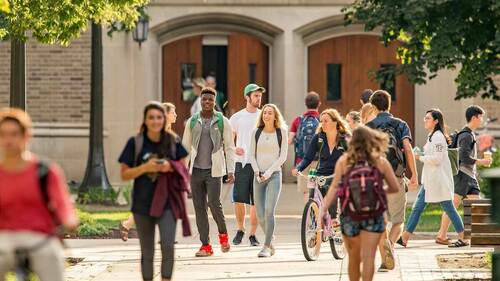
The University of Notre Dame announced today new strategies for strengthening undergraduate residence hall communities, including incentives for seniors to live on campus and a requirement that first-year, sophomore and junior students live on campus for six semesters.
Based on input from students and extensive discussions with the Board of Trustees, the strategies seek to enhance the University’s long-standing residential mission of forming communities that are inclusive of all members and dedicated to the intellectual, moral and spiritual development of Notre Dame undergraduate students.
“Residential life is a distinct and beloved feature of a Notre Dame undergraduate education, ultimately contributing to the formation of our students in the Catholic, Holy Cross tradition,” said Rev. John I. Jenkins, C.S.C., Notre Dame’s president. “It is my hope that these new approaches will reinforce the crucial role of residential life and our desire to make this experience even more meaningful and attractive for all students.”
With the aspiration that students will choose to stay on campus for four years, the University will soon provide incentives to senior students to live in residence halls. The incentives, shaped by suggestions from students, parents, rectors and University leadership, will range from increased flexibility in meal plans and room picks to additional leadership roles for seniors in the halls. Student Government and student focus groups provided valuable insight into which incentives would be most meaningful to seniors, and conversations about the specifics of each new offering will benefit from continued student feedback through the Hall Presidents’ Council as implementation occurs over the next two to three years.
“Our residential model is at its best when members of each class year have an active, substantial presence in the hall,” said Erin Hoffmann Harding, vice president for student affairs. “Seniors are crucial mentors within our communities, and the University seeks to recognize the contributions of students who choose to live in the halls all four years.”
In addition to offering incentives to seniors who choose to remain on campus, the University will require future first-year students, sophomores and juniors to live on campus for six semesters.
Consistent with its desire to solidify the residential experience as an essential component of a Notre Dame undergraduate education, the new policy will begin with the matriculating class of 2018 (graduating class of 2022). Study abroad facilitated through Notre Dame International will automatically count toward the fulfillment of the six-semester expectation, with other exceptions considered on an individual basis.
This policy will require additional residence hall space, and the University is actively seeking benefaction for two new halls. The new space will also make it possible for Notre Dame to provide additional on-campus housing to transfer students.
These new undergraduate strategies arrive at a time when the University continues to partner with the local community to ensure safe, affordable and convenient off-campus housing options for its graduate and professional students. With the on-campus University Village and O’Hara-Grace town houses scheduled to close in summer 2018, Notre Dame is preparing referral resources that will better inform and support post-baccalaureate students in their housing search. These referral resources, including a new website search tool, are expected to launch later this semester.